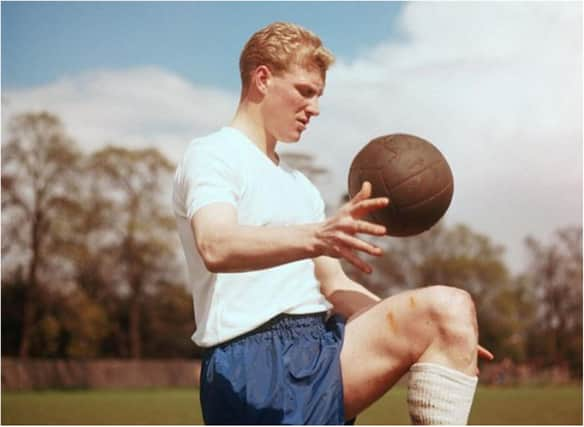Doncaster-born England 1966 World Cup winner Ron Flowers dies at 87


Edlington-born Flowers was a non-playing member of the squad which defeated West Germany 4-2, earning 49 caps for England and making 515 appearances for Wolves between 1952 and 1967.
Flowers helped the Midlands club to three First Division titles and the FA Cup during his 15 years at Molineux.
Advertisement
Hide AdAdvertisement
Hide Ad"We are deeply saddened to announce the passing of club legend and vice president Ron Flowers MBE at the age of 87," said Wolves.
"A giant on the pitch and a gentleman off it. There will be many people remembering Ron today and all of our thoughts are with those who knew and loved him."
Born on July 28, 1934, he began his football career with the Doncaster Rovers academy, where his father played semi-professionally.
While he flourished on the pitch at Belle Vue, he also trained as an apprentice at the Doncaster rail sheds, at his father's insistence that he learn a trade outside of football.
Advertisement
Hide AdAdvertisement
Hide AdHe was later released by Doncaster and joined the Wolves' nursery side Wath Wanderers, where he soon came to the attention of the highly successful Wolverhampton Wanderers manager Stan Cullis.
Within a year, he was moved down to Molineux and soon broke into the first team, making a scoring debut against Blackpool on 20 September 1952. Prior to this time, he had served in the RAF and became an Aircraftman Second Class at Padgate before being transferred to Hednesford.
He was the last surviving member of the Wolves 1960 FA Cup Final team. In total, he made 515 appearances for the club, scoring 37 times.
Flowers won 49 caps for England and scored 10 goals.
His international debut came on 15 May 1955 in a 0–1 friendly defeat to France. He went on to appear in the 1962 World Cup and scored two goals from the penalty spot in the first two games of the group stage. From November 1958 until April 1963, he appeared in 40 consecutive England international matches; only Billy Wright has appeared in more.
Advertisement
Hide AdAdvertisement
Hide AdHe also has the distinction of scoring England's first goal in a European Football Championships game - in the qualifying round first leg against France at Hillsborough on 3 October 1962.
Although his last England cap came before the finals, he was a member of the squad that won the 1966 World Cup, being the oldest and earliest-capped member of the squad.
Flowers narrowly missed out on playing in the final itself.
Jack Charlton who was due to play, caught a cold on the eve of the West Germany match.
Flowers was approached by his manager, Alf Ramsey, the night before the final and told that if Charlton had not recovered by the morning he was on.
Advertisement
Hide AdAdvertisement
Hide AdAfter a sleepless night, it turned out that Charlton was fine in the morning and, ultimately, Flowers never kicked a ball at the tournament.
He finally left Wolves in September 1967 to join Northampton Town, where he later became player/manager. He ended his playing career at non-league Wellington Town as player-manager before retiring to run a sports shop in Wolverhampton.
His sports shop "Ron Flowers Sports" is still successfully trading on Queen Street in the city centre.
His younger brother, John Flowers, and his uncle, George Flowers both played over 100 games professionally for Doncaster Rovers and in March 2017, Flowers' grandson, Harry, was signed by Premier League side Burnley.
Advertisement
Hide AdAdvertisement
Hide AdHis sister-in-law is former darts world champion Maureen Flowers, the wife of his brother John.
Flowers was appointed Member of the Order of the British Empire (MBE) in the 2021 New Year Honours for services to football.
Along with Jimmy Greaves, Flowers and the other players who didn’t feature in the 1966 World Cup Final received a winners’ medal from then-Prime Minister Gordon Brown at Downing Street in 2009, following an FA campaign for all members of the squad to be recognised.